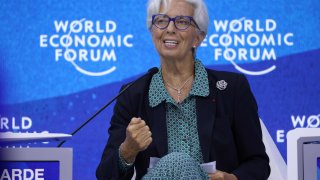
- Following its latest monetary policy meeting, the Governing Council announced that it intends to raise its key interest rates by 25 basis points at its July meeting, and expects a further hike at the September meeting.
- The ECB also downgraded its growth forecasts and upwardly revised its inflation projections significantly.
- Investors in the U.S. continue to look for signs of slowing economic growth ahead of May's consumer price index reading, which is slated for Friday.
LONDON — European stocks fell sharply on Thursday after the European Central Bank confirmed plans to begin hiking interest rates in July, while downgrading its growth forecasts and raising inflation projections.
The pan-European Stoxx 600 closed down 1.3% following the decision. Tech stocks fell 2.3% to lead losses as all sectors and major bourses slid into negative territory.
Following its latest monetary policy meeting, the Governing Council announced that it intends to raise its key interest rates by 25 basis points at its July meeting, and expects a further hike at the September meeting, the scale of which will be dependent on how the medium-term inflation outlook shapes up.
Get a weekly recap of the latest San Francisco Bay Area housing news. Sign up for NBC Bay Area’s Housing Deconstructed newsletter.
The ECB also downgraded its growth forecasts and upwardly revised its inflation projections significantly.
In terms of individual share price movement, French utility EDF climbed more than 7% to lead the Stoxx 600 after a report suggested the government was considering nationalizing the company.
At the bottom of the European blue chip index, German meal kit delivery company Hellofresh fell 7.3%.
Money Report
European markets reacted negatively to the ECB's announcement on Thursday, with some economists having anticipated a sharper increase to interest rates next month after inflation for the 19-member euro area hit another record high in May.
"Holding rates at minus 0.5% despite record inflation, the ECB looks late to the party compared to the Fed," said Robert Alster, chief investment officer at Close Brothers Asset Management.
"However, the EU labour market is not overheating, and wage growth is robust but moderate. The bulk of the rise in inflation relates to energy and food prices."
Alster suggested that rate rises in July and September were already baked into market pricing, and Thursday's decision will "likely have done little to change that view."
"A rise will likely be positive for European banking stocks, and marginally negative for other sectors, but the impact pales in comparison to the issue of Europe's access to energy," he added.
"The ECB does appear to be joining the "hike-brigade" but we do not expect Europe to attempt to overtake the Fed. Rather, the ECB is simply following the U.S. lead, and we do not expect more aggressive tightening whilst the war in Ukraine continues to weight on sentiment."
On Wall Street, stocks were modestly lower on Thursday as investors monitored the health of the economy ahead of a key inflation report.
Investors in the U.S. continue to look for signs of slowing economic growth ahead of May's consumer price index reading, which is slated for Friday. The data is expected to come in slightly below April's numbers and could indicate that inflation has reached its peak.
Enjoyed this article?
For exclusive stock picks, investment ideas and CNBC global livestream
Sign up for CNBC Pro
Start your free trial now
—CNBC's Jesse Pound contributed to this article.






